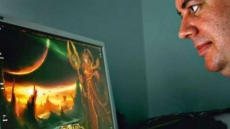VANCOUVER — Criminologists at a British Columbia university are exploring uncharted waters with a first-of-its-kind study that monitors decomposing pig carcasses to better understand how human bodies break down hundreds of metres underwater.
The Simon Fraser University study, published earlier this month in the journal PLOS ONE, revealed the decaying process at depth is dramatically different than what takes place in shallower Pacific waters.
The study's authors, forensic specialists Gail Anderson and Lynne Bell, said the results stand to help investigators learn more about bodies that are recovered at depth.
The pair's research involved strapping the bodies of several pigs to metal grates and submerging them 300 metres via submarine to be deposited beneath a pre-existing monitoring installation.
Pig bodies can last weeks or even months when deposited near the ocean's surface, said Anderson in an interview, but at 300 metres they're whittled down to bone in as few as three days.
She described video footage showing a colony of amphipods, commonly known as sea lice, swarm the animals' bodies and drive away other scavengers, such as spot prawns and crabs.
"They just covered the bodies in four-to-five-inches-deep layers of amphipods, which just inhaled — basically ate — the entire carcass, inside out," she said.
"Once in a while a fish would swim over the top and knock some of the amphipods off and you'd see the skin was still intact, so they were going in through the orifices and removing all the soft tissue. And they did that in three to four days, depending on the season."
Sensitive monitoring instruments also measured a sharp decrease in oxygen levels around the feeding site, which Anderson speculated may help repel other would-be feeders.
"That's not been seen before," she said, describing the discovery as exciting.
"It would seem that when you've got that vast number of animals feeding in a frenzy on a body like that, that they actually deplete oxygen from the water, which is amazing."
Anderson reasoned that this deoxygenation, coupled with the noise projected from the mass of moving creatures, may one day allow investigators to pinpoint the location of missing bodies from a distance.
"We're not there yet," she said. "But maybe in the future."
Laurel Clegg, a manager with B.C.'s coroners' service, said the study can help investigators come up with a more accurate time frame for linking recovered human remains to possible missing people.
"It's exciting that people are doing this research. It's important that people are doing this research. It is used. It is relevant. It does assist us in our daily work," Clegg said.
"It does help us, even if it's in this micro way. Even if it shortens an investigation by a few days it's really important."
Pigs are commonly used in forensic research as a proxy for people thanks to their similarities to humans, including their relative hairlessness, similar torso size and omnivorous diet, which influences the bacteria content of their gut.
The research was conducted using a state-of-the-art deep-sea monitoring station. The installation is part of the VENUS observatory network, which is able to stream on-site video in real time, as well as measure the turbidity, temperature, salinity and oxygenation of surrounding waters.
Anderson said she and Bell hope to move their experiment into deeper waters using other VENUS sites located further offshore and at depths of up to two kilometres.





